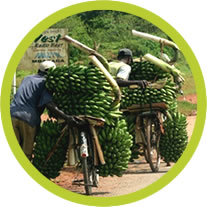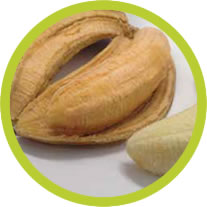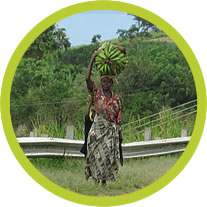Banana21 Factsheet
Print version [PDF]
PRO-VITAMIN A BANANA RESEARCH
In Uganda, East African highland cooking banana varieties, locally known as “matooke,” are a staple of the traditional diet, and no other food has the same reach or importance throughout the country. To address persistent vitamin A deficiency, local researchers are working in collaboration with Australian scientists to enrich banana, the staple food of Uganda, with this vital nutrient.
THE NEED FOR PRO-VITAMIN A
Throughout Uganda, more than 1/3 of women |  | of children aged 6 - 59 months. |
 | of women aged 15 - 49 years. |
THE NEGATIVE EFFECTS OF VITAMIN A DEFICIENCY
Leading preventable cause of blindness among children. | Impairs immune system and increases the risk of death from common infectious diseases among younger children. | Higher impact on women who are pregnant or breast feeding, as their vitamin A needs are greater. |
VITAMIN A DEFICIENCY IS PREVALENT IN AREAS WHERE PEOPLE CONSUME STARCHY FOODS, SUCH AS COOKING BANANAS, CASSAVA, MAIZE AND RICE, AS THEIR MAIN SOURCE OF CALORIES.
These foods are typically low in vitamins and minerals – but more nutritious foods such as eggs, meat and fruits are often expensive, scarce or unavailable.
THE SITUATION IN UGANDA
In Uganda and other countries where vitamin A deficiency is prevalent, efforts to address the issue include supplements, food fortification and dietary diversity programs. Despite these efforts, millions of people still suffer from vitamin A deficiency and are in need of better nutrition.

A CASE FOR MORE NUTRITIOUS BANANAS
According to current government estimates, the average consumption of bananas in Uganda could be in excess of 500g per person per day. With more than 12 million tons of bananas produced each year, they are an affordable, locally produced, sustainable and easily accessible source of food year-round.
East African highland cooking bananas are the most important staple food in Uganda, but currently are not a good source of pro-vitamin A. Developing more nutritious varieties should have a huge impact on the health of women and children across East Africa.
OUR CONTRIBUTION
Varieties of East African highland cooking bananas are being developed with high levels of pro-vitamin A. Plants produce alpha- and beta-carotene which are found in many fruits and vegetables such as mangoes and spinach, and are converted to vitamin A by the body, as needed.
Since most cultivated bananas are nearly sterile, transferring a trait from one variety into another is extremely difficult using conventional breeding. Therefore, a pro-vitamin A-rich cooking banana is being developed with the tools and techniques of modern biotechnology, including tissue culture and genetic modification.

Banana varieties with relatively high levels of pro-vitamin A already exist in some parts of the world, but are unfortunately very low yielding and not suitable for cooking. For this project, we’re using a gene from one of these vitamin-rich banana varieties called “Asupina.”
MOVING FORWARD FOR UGANDA

PRO-VITAMIN A COOKING BANANAS ARE UNDER DEVELOPMENT AND EVALUATION. CURRENT ACTIVITIES INCLUDE LABORATORY WORK AND FIELD TRIALS IN UGANDA AND AUSTRALIA AND A NUTRITION STUDY IN THE USA.
As with other genetically modified food crops, pro-vitamin A bananas have undergone rigorous safety evaluations, with more to come as the project progresses, in line with international regulatory standards.
Once research is completed (planned for 2021) pro-vitamin A banana varieties would be thoroughly reviewed and authorized by regulatory bodies in Uganda before being available to farmers and consumers.
Research on pro-vitamin A-rich banana is part of the Banana21 collaboration between scientists at Queensland University of Technology in Australia and the National Agricultural Research Organization of Uganda. The project is funded by the Bill & Melinda Gates Foundation and the UK Department for International Development.
Distinguished Professor
Centre for Agriculture and the Bioeconomy
Queensland University of Technology, Australia
j.dale@qut.edu.au
+61 7 31382819
Centre for Agriculture and the Bioeconomy website
Director of Research
National Agricultural Research Laboratories
Kampala, Uganda
tkwilberforce@gmail.com
+25 6 712451321
narl.go.ug
Contact Us
Please feel free to contact us should you have any queries regarding Banana21 at banana21@qut.edu.au.
For more information about where we are located please visit our contact page.